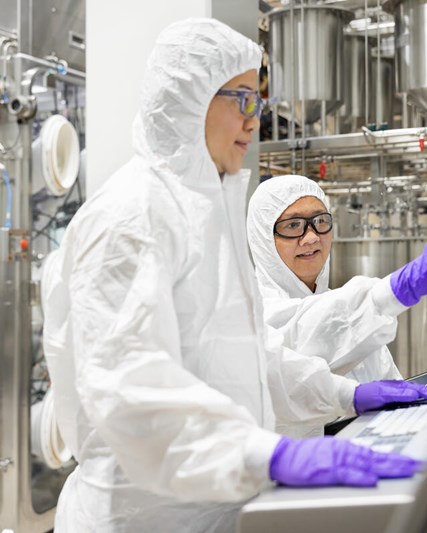Issued: London, UK
For media and investors only
GSK launches £6m programme to boost STEM career progression for young people from under-represented groups in the UK
- GSK to invest £6m in STEM equity-focused initiatives in the UK over ten years to tackle barriers to entry in STEM careers (Science, Technology, Engineering, Maths)
- Programme to kick-start with nationwide STEM mentoring targeting around 4,000 11-25-year-olds from under-represented groups over next three years
- GSK to work with Stemettes, STEM Learning, the Association for Black and Minority Ethnic Engineers, Covent Garden Dragon Hall Trust and Spark! as key delivery partners
- New research reveals a nationwide focus on STEM mentoring of under-represented groups could boost individual incomes
GSK plc (LSE/NYSE: GSK) today announced the launch of a £6m, 10-year STEM equity programme, designed to inspire and support the next generation of scientists, technologists, engineers and mathematicians from under-represented groups in the UK.
The company’s new UK STEM equity programme aims to help reduce the significant barriers to entry faced by women and young girls, people from lower socio-economic backgrounds and Black communities (under-represented groups), which limit STEM career opportunities and contribute to the lack of diversity in STEM sectors.
A report commissioned by STEM Learning using data from the Office for National Statistics found significant differences in engagement with and attainment in STEM GCSEs and A-Levels across gender, ethnicity and socio-economic background[1]. This ‘STEM equity gap’ widens as young people progress into the workforce.
Mentoring young people aged 11-25 from under-represented groups, where one-to-one relationships are developed with mentors working in STEM who share tools and guidance to aid personal and professional development is highly effective in supporting them through STEM education.
The UK Education Endowment Foundation has calculated that the average benefit of mentoring – measured in terms of doing better in school – is equivalent to spending two additional months in the classroom, with the best programmes providing a benefit equivalent to an additional five months.
Based on this evidence, the first initiative GSK will fund is high-quality STEM mentoring, which will reach almost 4,000 young people across the UK in the first three years, in collaboration with five established grassroots partner organisations, Stemettes, STEM Learning, the Association for Black and Minority Ethnic Engineers (AFBE), Covent Garden Dragon Hall Trust, and Spark!. In addition, GSK is encouraging employees working in STEM to become mentors by accessing opportunities from partner organisations through its employee volunteering portal.
The funding from GSK will expand and scale up existing mentoring models for STEM education in the UK and will focus on the bottom 25% of STEM 'cold spot' locations identified by the British Science Association, to target local communities where science infrastructure and education is most limited[2].
Emma Walmsley, CEO, GSK said: “Despite the breath-taking pace and promise of this age of science and technology, only human talent can realise the impact these advances make possible. And we know that diverse teams perform better, innovate better and help us better understand the diverse patients we serve. For the UK to be a leader in science and technology, we must remove barriers in STEM that limit people’s potential. That’s why GSK is very proud to announce new investment and new partnerships to boost STEM education and career progression among under-represented groups in the UK.”
Overall, it’s estimated the UK economy suffers a loss of £1.5bn per year due to STEM skills shortages[3]. Independent research commissioned by GSK reveals that if there was a nationwide roll-out of STEM mentoring targeting young people from under-represented groups, this could have a significant positive effect on the UK economy.
Independent research findings on the potential impact of a mentoring programme
- Mentoring increases the academic performance of under-represented groups at GCSE and A-Level and the number of students opting to study Maths A-Level. This matters for science careers and science-based industries because Maths is the cornerstone of science subjects.
- Mentoring improves the grades that students get at school, equipping more of them to attend elite, research-oriented universities. An increase in wages occurs when a student can attend a more selective university. Our research highlights the knock-on effect of mentoring at scale could raise individual incomes by up to £10,000 a year.
- GSK to work with Stemettes, STEM Learning, the Association for Black and Minority Ethnic Engineers, Covent Garden Dragon Hall Trust and Spark! as key delivery partners
- The effect of a large-scale and effective mentoring programme is likely to increase gender and socio-economic diversity in STEM and to bring forward the point at which the industry attracts and retains significant numbers of Black scientists.
Minister of State at the Department for Science, Innovation and Technology, George Freeman, said: “Our Innovation Nation mission is about supporting the innovation economy to create new businesses, industries and jobs all around the country so that everyone can benefit. The key to that is supporting under-represented groups into STEM careers in the UK.
“The UK still has significant differences in engagement with and attainment in STEM GCSEs and A-Levels across gender, ethnicity and socio-economic background, and the ‘STEM equity gap’ widens as young people progress into the workforce. Research shows that mentoring young people aged 11-25 from under-represented groups, where one-to-one relationships with STEM mentors who share tools and guidance to aid personal and professional development, is highly effective in supporting them through STEM education.
“Well done GSK for this £6m programme, we need more of this.”
Dr Anne-Marie Imafidon MBE, Co-Founder and CEO, Stemettes said: “The mentoring programmes Stemettes are delivering in partnership with GSK build science capital for young women and non-binary folk; through connecting them to a diversity of people already in the Science, Technology, Engineering, Arts and Maths sector, a set of peers and future collaborators. Building an impactful career is about relationships and there will be two-way learning across our mentoring pairs and their new extended network.”
Séverine Trouillet, CEO, STEM Learning said: “We believe that all young people in the UK, regardless of their background or circumstance, should have access to the STEM education and careers support that they need to thrive. Our Destination STEM online mentoring scheme is designed to develop confidence and understanding about STEM pathways and build vital science capital for the future. We are very excited to be working with GSK and other partners to improve STEM equity across the UK.”
About the research findings
In September 2023, GSK commissioned Public First to conduct independent research on the potential impact of a mentoring programme.
About Stemettes
Stemettes is an award-winning leading charity and social enterprise working across the UK & Ireland and beyond to inspire and support girls, young women and non-binary young people into Science, Technology, Engineering, Arts and Maths careers (known collectively as STEAM). Stemettes specialises in reaching girls and young women aged 5-25. https://stemettes.org/
About STEM Learning
STEM Learning is the UK’s leading provider of STEM education programmes for teachers - working across the UK into primary and secondary schools as well as FE Colleges. Our student facing programme – Destination STEM - offers a wealth of activities including engaging online workshops, research experiences, and mentoring to empower students, helping them to develop their practical, technical skills, and aspirations. www.stem.org.uk
About the Association For Black and Minority Ethnic Engineers (AFBE)
AFBE-UK is a non-profit organisation that works to increase the number of ethnic minority people who pursue a career and have successful careers within the engineering industry.
We promote diversity in engineering and technology through our programmes and activities which are led by exceptional professionals and leaders in the Engineering industry and are designed to bring about meaningful change, sustainable growth and development and a lasting positive impact to the UK. AFBE-UK was founded in 2007 in London to address the under-representation of minority ethnic people in engineering.
The organisation's programmes help to attract young people from all backgrounds into engineering, retain talent by addressing the crucial stage between academia and industry and raise leaders. AFBE-UK also works with more than 80 corporate organisations on their diversity and inclusion plan. So far more than 20, 000 beneficiaries around the UK have benefited from AFBE-UK's programmes. www.afbe.org.uk
About Covent Garden Dragon Hall Trust (CGDHT)
CGDHT works with the most socially excluded children and young people, aged 8-25 years old, providing them with fair and equitable access to three main areas: 1) STEAM-related programmes; 2) positive Mental Health & Well-being support; 3) mentoring, soft-skills & employment provision. These services have been described by the Guardian (2021) as “21st Century Youth Work”. www.dragonhall.org.uk
About SPARK!
Spark! supports the development of young people’s employability skills, knowledge, experience and access, so that they are better prepared for and able to effectively transition into the workplace and a meaningful career. They provide a diverse range of employer engagement opportunities, inspiring career mentoring relationships, high quality work experience and supported transitions into employment. www.sparkcharity.org.uk
About GSK
GSK is a global biopharma company with a purpose to unite science, technology, and talent to get ahead of disease together. Find out more at gsk.com/company.
Cautionary statement regarding forward-looking statements
GSK cautions investors that any forward-looking statements or projections made by GSK, including those made in this announcement, are subject to risks and uncertainties that may cause actual results to differ materially from those projected. Such factors include, but are not limited to, those described under 3.D ‘Risk factors’ in the Company's Annual Report on Form 20-F for 2022, and Q2 Results for 2023.
References
- [1] Science Education in England, STEM Learning, February 2022
- [2] Mapping and analysis of science engagement and inequity in the UK, British Science Association, March 2022
- [3] Addressing the STEM skills shortage challenge, The Institution of Engineering and Technology, 2021



